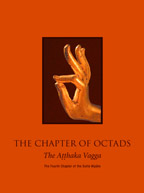|
|
| New
Books Published Soon |
| BUDDHA
by Venerable Balangoda Ananda Maitreya
|
| The most Venerable
Aggamahapandita Balangoda Ananda Maitreya Thero, the author of this
book, ordained at the age of fifteen and become a recognized teacher
and expositor of Buddhist doctrine very soon in Theravada as well
as Mahayana school. He is well known among the scholarly community
in the world for his mastery of the doctrine as well as knowledge
in Pali, Sanskrit and several other languages. He is must sought
after by them in unraveling controversial and difficult points in
the doctrine. He has written a large number of books on Buddhism,
well used for reference. |
 |
|
|
THE CHAPTER OF OCTADS
The Atthaka Vagga, the fourth chapter of the Sutta Nipata
Translated from Pali by Bhikkhu Varado |
| The
Chapter of Octads (i.e. ‘chapter containing suttas with eight
verses’), is the fourth chapter of the Sutta Nipata and consists
of sixteen short suttas in metrical form. In fact only four of the
suttas are octads; a few of them have even twenty verses. The Buddha
seems to have composed the Chapter of Octads near the beginning
of his teaching career, because discussions concerning it are mentioned
in other parts of the Pali canon. The importance of the Chapter
of Octads to the early monks is illustrated in a story concerning
Venerable Sona, who recited the sixteen suttas to the Buddha one
morning, having been invited by the Blessed One to share his dwelling.
Bhikkhu Varado trained as a medical doctor. He
was ordained as a bhikkhu by Ajahn Sumedho in 1988. He lives at
Amaravati Monastery in England.
|

|
|
| |
BEAUTIFYING THE MIND
by
Sayadaw U Pandita
|
| |
“Effort is a
vital theme in the Buddha’s teachings on mental development.
Many passages from the Tipitaka account for this. In a masterly
manner the Venerable Sayadaw U Panditabhivamsa of Myanmar has knit
the relevant teachings into an inspiring presentation drawn from
the Buddhist canon.
The Venerable Sayadaw is an exemplary manifestation
of someone who consistently applies heroic effort. Even at the age
of eighty he is still travelling far and wide throughout the year
to teach insight meditation and spread the Dhamma. This book is
based on a series of talks given during an insight meditation retreat
conducted at the Panditarama Vipassana Meditation Centre, Lumbini,
Nepal, in February 2000.
The talks were delivered to a mixed audience of
Western meditators and a larger group of Newari Buddhists from the
Kathmandu valley, some of whom would be direct descendants of the
Sakyamuni clan of the Buddha. The talks contain reference to both
groups as the Venerable Sayadaw endeavours to encourage the individual
meditators in their practice.”
~ from Foreword by Bhikkhu Vivekananda
|
|
| |
RATANA SUTTA
Discourse
on the Jewels
by Venerable Dhammasubho
|
Although
these three Suttas or discourses namely Mangala Sutta, Metta Sutta
and Ratana Sutta are the most well known Suttas among Malaysians,
much have been written or explained on Mangala Sutta and Metta Sutta.
However there is hardly any book that explains the meaning of Ratana
Sutta other than the direct translation that is widely available.
Here Venerable Dhammasubho has extracted from a few sources (mainly
from the Dhamma talks by Venerable Dr. K. Sri Dhammananda) which
explain the meaning of this Sutta. Although in some verses it is
not explained in detail, it would be a good start to understand
the profound meaning of each verses.
Venerable Dhammasubho, a Malaysian monk ordained in Thailand
has been staying in Thailand and Myanmar for some time. Other
books edited or translated by him are LIGHT OF WISDOM by Pak Auk
Sayadaw and RADIATING LOVING-KINDNESS: The teachings on Metta
Sutta & Khandha Paritta by Thabyekan Sayadaw.
|
|
|
| |
THE VIPASSANA RETREAT
by
Venerable Pannyavaro
|
| |
A practitioner of Vipassana
meditation since 1974, Venerable Pannyavaro teaches at the Bodhi
Tree Forest Monastery and Retreat Centre, Tullera, near Lismore,
Northern New South Wales, Australia.
This guidebook by an Australian meditation monk takes an in-depth
approach to Vipassana meditation. It describes the required supportive
conditions of a retreat centre, with clear and detailed instructions
on the techniques as well as practical advice on how to manage oneself
in an intensive retreat environment.
As a guidebook it offers a framework for the teachings based on
the source material: THE FOUR ESTABLISHMENTS OF MINDFULNESS. It
includes sections on mindfulness of the body, being aware of feelings,
orientating to the sense doors, the supportive practice of loving-kindness,
how to report the practice in the daily interview, difficulties
facing meditators and how to work with them as well as advice on
continuing the practice at home.
Included with this guidebook on Vipassana Meditation is an audio
guide to the practice on CD-Rom.
|
|
| |
Some facts to know about the
DEVELOPMENT of VIPASSANA NANA (Insight Knowledge)
by
Sayadaw U Kundala; Translated by Daw Khemanandi (Canadian)
|
“Today, Vipassana Meditation has become quite prominent
and widespread and Buddhists have come to practise vipassana meditation
in as much time as possible. As their samadhi (concentration)
and nana (insight) develop with their vipassana practice, they
come to experience and know the nature of the Dhamma. As they
come to experience and know the Dhamma, they would like to know
whether what they have experienced and know are correct. They
would also like to know the level of nana they may have reached.
This series of Dhamma discourses on the development of the different
levels of nana have been written with the express purpose that
the vipassana practitioners may come to know about the nature
of the different levels of nana and be motivated to have a heightened
desire to practise vipassana bhavana (meditation) diligently and
put more diligent effort into their practice.”
~ from Introduction by Sayadaw U Kundala (Saddhammaramsi Sayadaw)
|

|
|
| |

